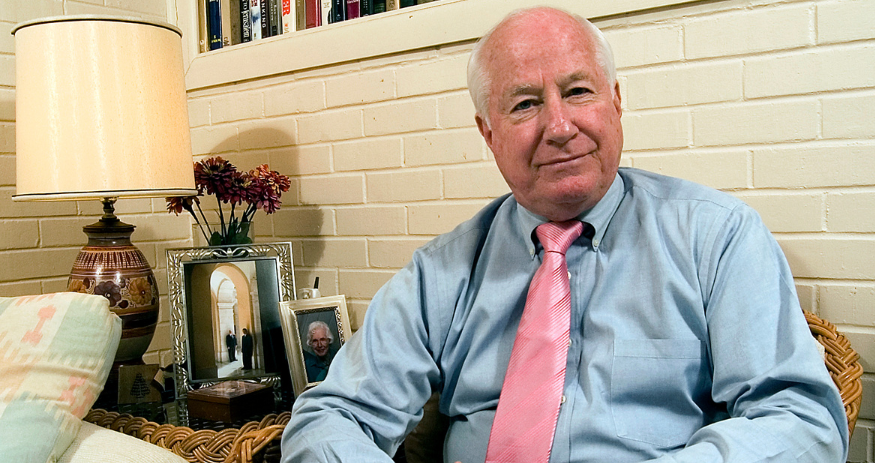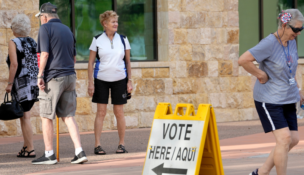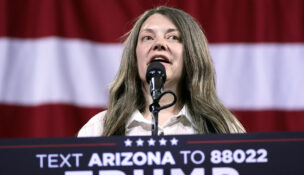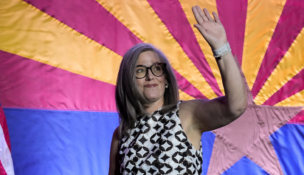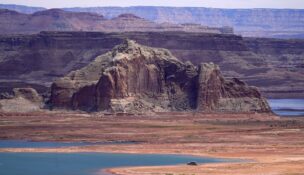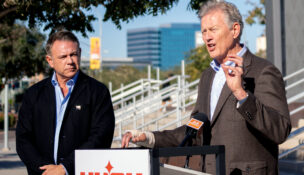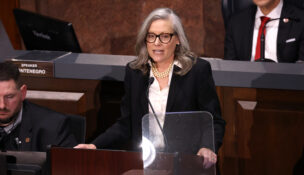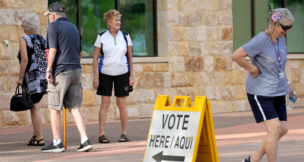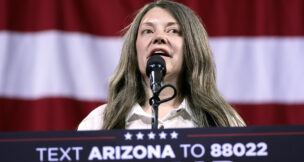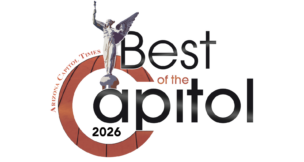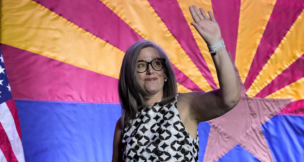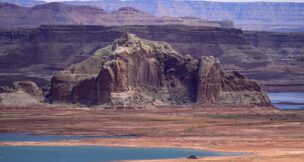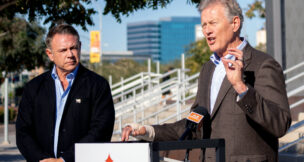From boycotting Bush to endorsing Trump: A history of Log Cabin Republicans in Arizona
Reagan Priest Arizona Capitol Times//October 31, 2024//
From boycotting Bush to endorsing Trump: A history of Log Cabin Republicans in Arizona
Reagan Priest Arizona Capitol Times//October 31, 2024//
1996 was a banner year for gay Republicans in Arizona.
Republican U.S. Rep. Jim Kolbe of Arizona publicly came out as gay. Mayor Neil Giuliano of Tempe, then a Republican, followed suit a month later. Steve May was running to become the first openly gay Republican in the Arizona Legislature. And Log Cabin Republicans of Central Arizona began meeting, marking the start of the group’s presence in the state.
“We really thought ‘96 was a real critical year, an inflection point in the Republican Party accepting gays,” May said.
Nearly 30 years later, a new generation is reviving the club and shifting its leanings rightward to align with the GOP’s modern evolution. While former members are excited to see the group grow and evolve, some, like May, say they think Arizona’s gay Republicans have lost perspective.
The Log Cabin Republicans national organization got its start in California in the 1970s. The group’s name references President Abraham Lincoln, an icon of the Republican Party who was born in a log cabin. The group currently has chapters in 36 states, and is the first and largest group representing LGBTQ+ conservatives in the U.S., according to the Log Cabin website.
LGBTQ+ voters have long been seen as an important voting bloc for Democrats, but not all of them lean to the left. According to an April report from the Pew Research Center, 17% of gay/bisexual men and 12% of gay/bisexual women surveyed say they lean Republican.
Current and former members of Log Cabin in Arizona agree that more needs to be done in the state to move the GOP forward on LGBTQ+ issues. Since its inception, the group focused on moving the needle within the state Republican Party to make it more accepting of the LGBTQ+ community and its causes, to varying degrees of success.
Chapter One: ‘An Exciting Time’
Log Cabin Republicans of Central Arizona, or LCRCAZ as it was known at the time, made a splash in the LGBTQ+ community and state politics in 1996. The group endorsed May during his run for the state Legislature in 1996 and began to host meetings with local GOP politicians.
May remembers the first meeting occurring at someone’s house in 1996, before graduating to meetings at local bars and the Spaghetti Factory in downtown Phoenix. The group met once a month or every other month, and many members volunteered their help for May’s campaign.
Despite the group’s increasing influence, May lost his legislative race, something Phoenix’s gay news outlet, Echo Magazine, attributed to his straddling of two worlds.
“The problem is, May is not ‘gay enough’ to please gay and lesbian community leaders, and he is ‘too gay’ to suit his own party leadership,” read a column in an October 1996 issue of Echo.
May’s loss in 1996 did not deter LCRCAZ members, who helped him mount another campaign in 1998 – one that received endorsements from local gay organizations and was ultimately successful. Log Cabin’s influence in LGBTQ+ politics in Arizona only grew from there.
May was able to advocate for the gay community from a Republican perspective, which gave him an advantage over Democrats who had been trying to advance gay rights issues in a GOP-controlled state Legislature. Using his majority membership, May successfully pushed a bill that repealed the state’s sodomy laws, legalizing sexual acts and cohabitation outside of marriage for both homosexual and heterosexual couples.
“We were able to carry a message that the partisan gay Democrats couldn’t carry to people who were in power,” May said.
At the same time, LCRCAZ hosted events for 50 to 75 attendees with prominent Arizona Republicans at the time, like Gov. Jane Dee Hull, Superintendent of Public Instruction Lisa Graham Keegan and Maricopa County Sheriff Joe Arpaio.
But it wasn’t all acceptance after May was elected. He had to publicly defend his identity when a fellow Republican representative made homophobic comments during a committee hearing. Even though May was openly gay, the public admission at the hearing almost led to his discharge from the U.S. Army (Reserves) under “Don’t Ask, Don’t Tell,” the policy that prevented service members from speaking about their sexuality.
After winning re-election in 2000, May lost the GOP primary in his third run for the House in 2002 when redistricting placed him in a race against two fellow Republican incumbents.
LCRCAZ also began to take hits when the 2004 re-election campaign for President George W. Bush started. The national arm of Log Cabin Republicans had endorsed Bush in 2000 after he agreed to take action on the HIV/AIDS crisis and allowed openly-gay Kolbe to speak at the Republican National Convention that year.
However, Bush made a ban on same-sex marriage a cornerstone of his re-election campaign with his support of the Federal Marriage Amendment. It was a move that Log Cabin Republicans like May saw as a betrayal.
Chapter Two: Behind Closed Doors
A few years after May took a step back from Log Cabin, he received a call from a young, gay Republican interested in reviving the group. His name was Matt R. Salmon.
The son of former U.S. Rep. Matt J. Salmon, R-Ariz., Matt Salmon Jr. had recently come out as gay and was looking for a way to combine his conservative upbringing with his newfound identity. Salmon asked around and was told about Log Cabin Republicans. He reignited the group and became its president in 2009.
This new, late-2000s version of Log Cabin Republicans in Arizona was smaller and based mainly on word-of-mouth. Salmon inherited a list of names and phone numbers that he used to invite people to events with local politicians. He estimated that the group saw around 20 people at most events.
Despite Bush’s stance on same-sex marriage during his 2004 campaign and final term in office, Salmon said the group did not face any outright backlash from Republican politicians in Arizona. But that didn’t mean they were outright supportive either.
“Many of them would come and say ‘I support your cause, I am LGBTQ+ accepting and I believe in what you are doing. However, if I were to be very vocal in public about it, I probably wouldn’t get elected,’” Salmon said.
In mid-2010, Salmon started medical school and realized he couldn’t keep up with his studies and run Log Cabin Republicans. Salmon said he was starting to feel disillusioned with the idea of being a gay Republican after not receiving any real support from elected officials in the local party.
He turned the group over to the national board, tasking it with finding new leadership to keep the Arizona chapter going.
Chapter Three: The Lost Years
The 2010s were a tumultuous decade for Log Cabin Republicans in Arizona. The group changed leadership multiple times and never seemed to regain the traction built in the ‘90s. Though the period brought monumental victories for LGBTQ+ rights – like the U.S. Supreme Court decision that legalized gay marriage – gay Republicans in Arizona could not seem to capitalize on those wins.
In 2012, the Log Cabin Republican national organization turned to Matt Shuman, an Arizonan who had recently moved to Washington, D.C., and tasked him with keeping the group alive until a new leader could be found. Shuman ended up running the group passively as new leaders came and went.
“Being from Arizona, I just didn’t want the Arizona chapter to completely die,” Shuman said.
He kept the group’s social media pages active and fielded requests from people looking to join, but the chapter didn’t hold events or have any formal activities during that period. A few people with an interest in leading the club came along, but none stuck.
Erin Ogletree briefly served as chair of the Arizona Log Cabin Republicans in 2013 while also running the campaign for Equal Marriage Arizona, an initiative that would have amended the state’s Constitution to allow same-sex marriages.
The Arizona initiative fizzled before it could make it to the ballot, as did Ogletree’s tenure as chair of Log Cabin Republicans in Arizona. She said the group had fewer than 10 members at the time and was largely focused on the Equal Marriage Arizona campaign.
“It wasn’t functioning as an organization, and we were trying to put it back together,” Ogletree said. “I met with some people about that, and then I think the decision we jointly made is that we were not going to try to reconstitute the group.”
Ogletree left Arizona for Colorado shortly after that, and later left the Republican Party entirely.
After the failed revival in 2013, the group came back into Shuman’s hands for a few more years. Eventually, in 2016, he relinquished control to a new set of leaders who planned to reignite a chapter in Phoenix. A Tucson chapter of Log Cabin Republicans was also formed and operated separately from the Phoenix chapter.
Chapter Four: ‘Fourth and Final Iteration’
By 2019, Log Cabin Republicans found a foothold in Tucson, but the Phoenix chapter was inactive. Marrell Livesay, the leader of the Tucson group, decided to put out feelers to see if there would be interest in reinvigorating the Phoenix chapter.
Cale Ottens had recently moved to Phoenix from Los Angeles, where he had first learned about Log Cabin Republicans. He was eager to create that space in Phoenix and reached out to Livesay for more information.
“There were, like, five of us sitting around a dining room table in Paradise Valley trying to figure out where to start,” Ottens said.
After months of conversations, Log Cabin Republicans of Phoenix officially launched in mid-2020. Kelli Ward, then the chairwoman of the Arizona Republican Party, spoke at the group’s first event.
The group now has a state board and three chapters – with the third launching in northern Arizona in October. The current state chairman of the group, Braden Lopez-Biggs, said there are 150 to 160 dues-paying members. He said he expects that number to grow now that the group has expanded into northern Arizona and has plans to launch in Mohave County next year.
The members are more active than ever, with the Phoenix and Tucson chapters hosting multiple events each month featuring Arizona’s most prominent politicians. The Phoenix chapter even boasts state Rep. Matt Gress, R-Phoenix, as one of its members. If estimates are to be believed, the Arizona chapter is the second largest in the country, behind the Los Angeles group.
But like their predecessors, today’s Log Cabin Republicans see most of their backlash coming from the local LGBTQ+ community. One of the biggest struggles the group faces is finding venues to host their monthly events. According to Ottens, they’ve cycled through a few locations in “the gayborhood,” or Phoenix’s Melrose District, where many LGBTQ+ businesses are housed.
“The word Republican is in our name … and that turns off a lot of business owners, even some conservative ones who have businesses in the Melrose District or the gayborhood, because they don’t want to be canceled,” Ottens said. “They don’t want to be boycotted or face backlash for allowing a Republican organization to congregate at their establishment.”
The Phoenix chapter once found a semi-permanent home for mixers at Sazerac, a bar in downtown that isn’t explicitly billed as a gay bar, but is known as one among the local community. Sazerac’s owner is a member of Log Cabin and was happy to host the group, Ottens said.
But days before the 2022 midterm elections, the group found itself in the middle of a mini-controversy. A Log Cabin member working for Kari Lake’s gubernatorial campaign brought some of her signs to an event at Sazerac, where another bargoer took videos and photos. They were posted online, prompting backlash from the local LGBTQ+ community that led to accusations that Sazerac was hosting a rally for Lake.
After over a year of meeting at the bar, Log Cabin was asked to find a new location for its monthly events. The bar was facing threats of boycotts and couldn’t risk the impact to business, according to Ottens.
“That was really disappointing,” Ottens said.
Many members of Arizona’s LGBTQ+ community take issue with Log Cabin’s support of candidates like Lake and former President Donald Trump. Not only do members endorse the two, many have worked for their campaigns.
Lopez-Biggs, the current state chairman, said he understands why the LGBTQ+ community is wary of Trump and today’s Republican Party, given the party’s history with the community. But he and other members of Log Cabin feel that the Republican Party is more gay-friendly than it ever has been.
“For anybody to say that the Republican Party is anti-LGBTQ, I don’t think that that’s the reality,” Lopez-Biggs said.
He and Ottens point to Trump’s nomination of Richard Grenell, the first openly gay person to hold a cabinet-level position, as well as former First Lady Melania Trump’s public support and fundraising for Log Cabin Republicans.
“A lot of the opposition that Republicans used to have to certain things like same-sex marriage is no longer there today,” Ottens said. “So I would say the Republican Party today is much more inclusive than it has been historically.”
But while current members of Log Cabin in Arizona work for and endorse the Trump campaign, former members are working with Republicans for Kamala Harris – or are not registered Republicans at all.
May, who saw the initial launch of Log Cabin in the state, is a member of the Arizona Republicans for Harris advisory committee. Salmon, who restarted the club in the late 2000s, is no longer a Republican. Both find the current group’s support of Trump unfathomable.
“We have made such advances in the last 30 years on the issue of legal equality that maybe it’s a luxury that people can support an authoritarian, wannabe dictator and still be gay, and they can feel like they’re comfortable enough that we won’t lose the rights that we have,” May said. “But I don’t think that’s how it works.”
May feels there’s still room in the Republican Party for LGBTQ+ people, but only if groups like Log Cabin work to hold the party accountable – something he says he isn’t sure is happening today.
“When I was involved, we were very careful never to become apologists of the Republican Party,” May said. “We challenged the Republican Party.”
Salmon said he knows it’s possible to be gay and Republican, but was unable to reconcile the two, hence his split from the party. He now works as a psychiatrist for LGBTQ+ youth in Washington, D.C. For him, the Republican Party’s rhetoric surrounding transgender people is especially off-putting, and Trump’s ever-changing policy stances are a slippery slope.
“It doesn’t matter if Trump is supportive or not because if these people, enough of them together, want to enact anti-LGBTQ+ policy and roll us back to the 1940s, Trump is going to just go with them,” Salmon said.
Despite the criticism, current members of Log Cabin in Arizona say they’re determined to move the needle on LGBTQ+ politics within the Republican Party. At this year’s Republican National Convention, party officials removed language from the official platform that described marriage as between one man and one woman. Lopez-Biggs said Log Cabin Arizona hopes to do the same with the state party’s platform.
But the biggest goal for the group is to make this revival of the Log Cabin Republicans of Arizona the “fourth and final iteration,” as Ottens likes to call it.
“They say the third time’s the charm, but I really think the fourth time for this one is going to be the sticking point,” Lopez-Biggs said.

